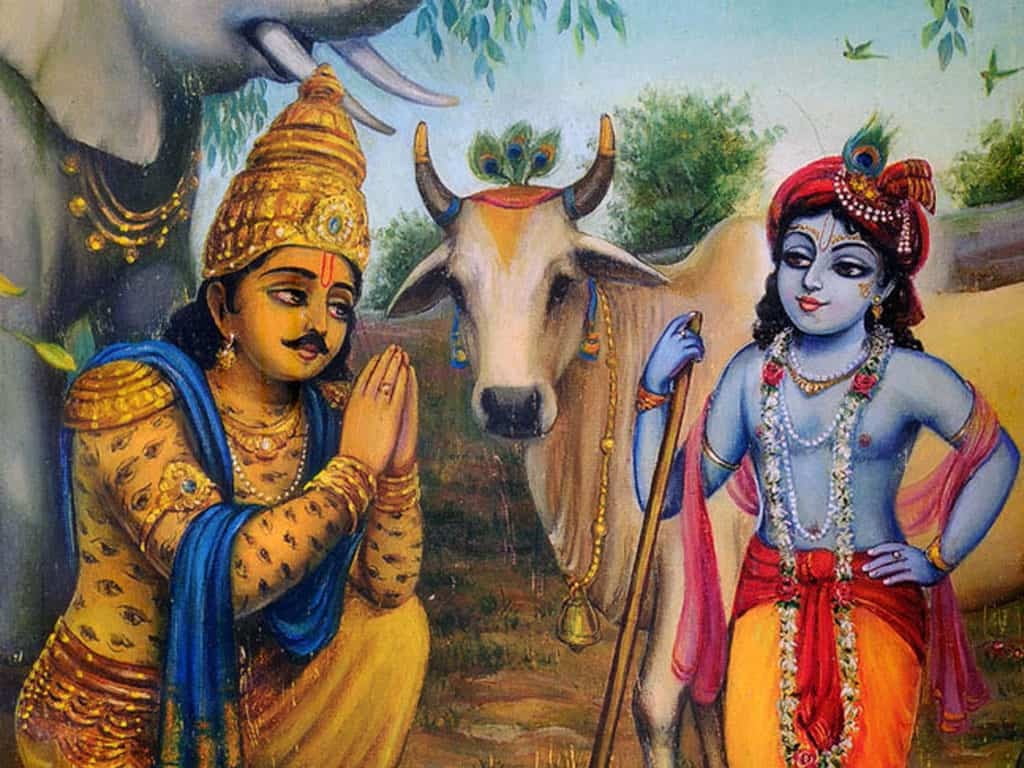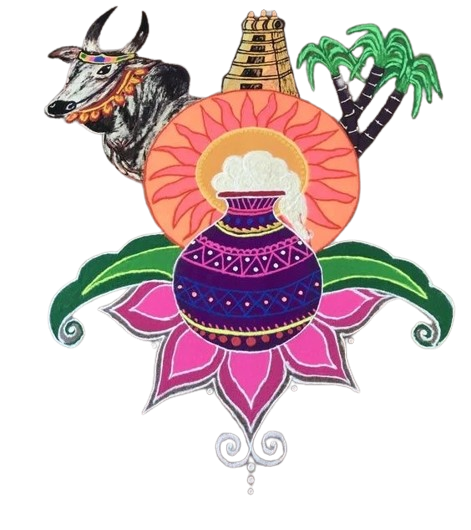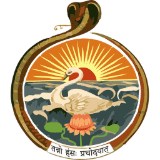
Om Thachchamyoraavruneemahe
Ghaatum yagnaaya ghaatum yagnapataye
Daiveesvastirastunah: Swastih: maanushebhyah:
Urdvam jigadu bheshajam
Sanno astu dwipate sam chatushpate
Om Shanti: Shanti: Shanthih:
‘We pray to whosoever bestows goodness, we pray for the successful completion of our oblations. We pray for the wellbeing of such performers.
Let Gods do good to us.
Let everyone be prosperous. Let the flora of plant kingdom grow rich.
Let all two-legged beings among us gain welfare. Let all four-legged animals get goodness.’
This prayer in Vedas is very apt for the Pongal festival.
Pongal is a four-day festival. It comprises of Bhogi, Pongal, Maattu Pongal, Kaanum Pongal in Tamil. When we observe how this festival has been structured, according to the above Veda mantra, we understand that it is essential for us to always be in harmonious coexistence with gods, humans, animals and plants.
FESTIVAL OF BHOGI – DISCARDING EGOISM:
Indra Deva, the supreme Deva, is also known as ‘Bhogi’. It is believed that by worshiping him one will get satisfaction, happiness and all good experiences in life. Varuna Deva, the God of rains, is subservient to Indra. It is extremely beneficial for a country to get seasonal rainfall sufficiently. By that, agriculture will flourish. Therefore, we have been celebrating Indra since ancient times for the sake of getting rains, prosperity and development.
The people of Brindavan used to perform annual prayers to Indra for rain. This had inflated the ego of Indradeva. To remove this evil tendency of Indra, Lord Krishna told the people, “this Govardhana hill which offers all wealth to us is worthy of our prayers; let us do a thankful worship to that hill this time”.
Thereby the people of Brindavan worshipped Govardhana hill. Noticing that the usual worship offered to Indra has been stopped and the hill was being worshiped instead, Indra became angry and ordered Varuna to pour very heavy rains.
Becoming afraid of this act, the people sought asylum with Lord Krishna. Immediately He lifted the Govardhana hill casually with his left little finger, held it like an umbrella and saved all people.
Krishna continued this for seven days. Indra apologised to Krishna, the Supreme god of gods for his egoism. Having seen the change of heart by Indra, Krishna bestowed with him a boon, “henceforth let this festival be named after you.”
Therefore, this ‘Bhogi’ festival, which is called by the name of Indra, denotes a message: ‘Egoism should be eradicated and evil tendencies should be extinguished.’
If love, intelligence, and spiritual power should grow, our egoism should go first. On the day of Bhogi, it would be great to burn the egoistic garbage of our minds rather than mere household rubbish.
Bhagavan Sri Ramakrishna would say, it is better to give up one’s ego than giving up the habits of beeda and betel nut chewing. Because it was his clear message that shedding one’s egoism is building a relationship with God.

PONGAL FESTIVAL FOR WORSHIPING SURYA DEVA:
Pongal is offered as a relishing dish, a combination of rice, dal and water which give us life.
The duration of one year for us is equal to one day for the celestial Devas. The daytime of the celestials consists of 6 months starting from the month ‘Thai’ in Tamil calendar (Jan- Feb). Any noble activity beginning from the month of Thai month will have a positive end, is the speciality attributed to the Pongal festival. Singing hymns in praise of the celestial Devas is our important worship on Pongal day.
Suryadeva remains the direct perception of God to the whole world. Rig Veda glorifies Surya as one of the three fire principles. Suryadeva is in all forms such as breath, fire, light, power, etc. He has been supplying light, heat, and power to the entire universe for eternity.
Atharvana Veda says, Surya is empowered to eliminate diseases like heart ailments, jaundice, etc. Surya ignites people towards physical and intellectual activities and thereby removing inertia and ignorance. We worship Surya everyday through Gayathri Mantra.
The meaning of Gayathri mantra is, ‘whoever provokes us with higher intelligence, I worship that superior power.’
It is a custom to cook rice Pongal and offer it to Suryadeva. Do you know what the scholars say about the dish called Pongal we cook in our day-to-day life?
SWEETENED RICE
There was a scholarly sage, Chidambaram Swami of Thirupporur Sannidhi Murai, a sect within the Saiva tradition. He says that we should offer Pongal not only on the first day of Thai month, but every day. And how? The Swami himself explains by way of a parable.
People use three stones as a stove to cook Pongal. It means that with three characters of love, patience and dispassion one should prepare the stove. So, the devotee’s characters are the stove.
Then we need firewood, fire, and a vessel. Firewood is our three-fold negative tendencies of arrogance, our deeds, and ignorance. Now, how to get fire to light up the firewood? Wisdom is the fire. With the appearance of Fire of Wisdom, our arrogance, effects of our misdeeds and our ignorance would all burn up.
The Swami advises us to place the vessel called ‘Soul – the Life Principle’ over the stove and drop all our good and bad into it.
By cooking this way, our mind will become fit for use. The very word ‘cooking’ means ‘evolving’.
To make this Pongal a tasty dish, it is customary to add sugarcane juice instead of jaggery, sugar, etc. That sugarcane juice is none other than God’s blessings. Once His grace is added, what we get is ‘sweetened rice, Madhurachoru in Tamil.’
When we remain steadfast keeping our attitudes in fit condition and also when God’s grace is added, the result is our getting supreme bliss. That bliss is none other than the ‘sweetened rice’, says Chidambaram Swami.
Thus, the meaning of Thai Pongal has a spiritual connotation that we should cook ourselves to become better and attain supreme bliss.
MAATTU PONGAL – A THANKS-GIVING TO ALL ANIMALS:
On this day we Hindus thank all animals by worshiping the most important holy animal, the cow. We think animals are inferior creatures. However, the fact is they are endowed with lower opportunities than us, but not inferior to us.
In Indonesia, the tigers reared by Buddhist monks allow their masters to climb and sit over them. They oblige to their masters’ commandments. When we express excessive love, animals also reciprocate by the same measure. When this can be the case with wild animals, imagine the friendly behaviour of domestic animals!
Hindu scriptures mention that all the deva devatas live inside a cow’s body. In the olden days, worshiping the guest (atithi puja) was followed as an important activity. Sastras say that after daily worship rituals, one should go out, look around and wait for a guest to share the food with him. Is there any time specified for such a waiting period?
Yes, it is said that one should wait for his guest for the time taken to draw milk from a fully filled udder of a cow. This indicates a fact that in olden days, our ancestors reared cow in their homes, and we understand that they treated them respectfully too.
Even today’s science confirms the efficacy of rearing cows as stated in our ancient spiritual stories. After a cow dies naturally, one should collect its horns and fill its hole with cow dung and bury it under the earth. After six months, the decomposed cow dung becomes an excellent oraganic manure for use in the agriculture field.
Through its horns cows attract a lot of celestial powers available in the space. It is believed that these animals transmit the power into the earth through their hoof.
The horns of a cow have the natural quality to preserve power. Cow dung has large amount of calcium oxide. It helps the organic growth of plants and microorganisms. Thus, filling the earth with ‘cow horn, cow dung manure’ and by adding a little amount of water, the life-giving power of that agricultural land would improve.
Thus, Maattu Pongal is the day when we offer our gratitude to that animal endowed with many special attributes. In many homes, they offer mixed rice to the birds and call the day ‘Kanu Pongal’. Married women offer prayers for the welfare of their parental relatives. Those who rear cows at home, will worship them. The day also marks the performance of heroic sports like Manju virattu, Jallikkattu, etc.
KAANUM PONGAL – THE DAY TO SEEK BLESSINGS FROM ALL:
The last day of Pongal festival is Kaanum Pongal. This is the day to seek personal wishes and blessings from the elders by visiting them. The day also marks when people happily meet and exchange pleasantries with neighbours and friends. This day indicates that one should mingle well with others and develop good characters.
Thus, Hindu Vedas give us the message of living a life without egoism, living with a matured mind by respecting Gods, animals and fellow human beings.
Pongal festival depicts this kind of a lifestyle. Hence on this beautiful occasion of Pongal, let God bless us all with abundance of wealth, full of health and a blissful life of harmonious coexistence with everyone around.
Swami Vimurtananda
13.01.2024
Saturday
